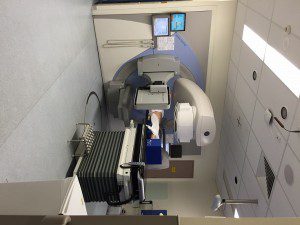
Liverpool Cancer Therapy Centre is leading the way with a new trial of radiation therapy for prostate cancer that negates the need for invasive surgery.
It also delivers a quicker, more targeted form of radiation therapy treatment.
The new treatment called stereotactic radiation therapy uses pin point precision technology to deliver very high doses of radiation to the prostate.
Liverpool Hospital radiation oncologist Dr Mark Sidhom said the treatment is administered in two separate visits to the hospital in three minute sessions.
Stereotactic radiation therapy offers the use of cutting edge technology which Dr Sidhom said shapes radiotherapy beams to deliver targeted doses of radiation that attack prostate cancer while keeping the dose delivered to normal organs such as the bladder and bowel low.
“The beauty of our new technology is that we can now watch the prostate as it is being treated, so that even if there is a tiny movement of the prostate, we can pause the radiation therapy, adjust the patient, and then restart the radiation,’’ Dr Sidhom said.
[social_quote duplicate=”no” align=”default”]“This means we can be sure the area we want to treat has received the right dose of radiation,” Dr Sidhom said.[/social_quote]
“Early data has been very encouraging with patients tolerating the treatment extremely well and the cancer response being obvious with a dramatic fall in prostate specific antigens (PSA) which are protein levels produced by cells of the prostate gland that are usually elevated in men with prostate cancer,” he said.
Stereotactic radiation therapy is expected to have the same chance of cure as surgery, without the need for an invasive operation.
Because it is not invasive, there can be a reduced risk of incontinence, and impotence.
So far, 25 patients have been treated at Liverpool Hospital, and a total of 50 patients have been treated in the stereotactic radiation therapy trial called Prometheus.
“We are excited to be at the forefront of prostate cancer research at Liverpool Hospital, offering men in the area very advanced treatment options,” Dr Sidhom said.
